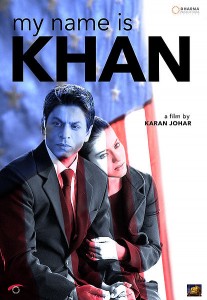This post is not about the Bollywood film ‘My Name is Khan‘, but the way it is perceived in India and the US and why. A look at the Hindi blog-posts related to this film reveals an interesting fact – that the reactions to this film have more to do with the cultural politics in India than with the aesthetic value of the film itself.
In the US, Shah Rukh Khan's recently released film “My Name is Khan” is doing well because it portrays the scenario in the West after the tragic events of 9/11 and attempts to show how Muslims in the US are perceived by the Americans. This portrayal draws from Khan's own experience at the Newark Airport last year when he was profiled for secondary interrogation by the airport authorities. This incident caused uproar in India and finally, the US Ambassador in New Delhi had to issue a statement to say that the causes of this incident will be investigated. The film narrates a similar story of an autistic Muslim in the US, who is harassed by the police after 9/11. To add an additional autobiographical touch to the film, his character in the film loves a Hindu woman. It's well-known that Shah Rukh Khan's wife in real life is a Hindu woman. Because of the growing unease with the Muslim population amongst the Western people of Europe and North America after the terrorist attacks of 9/11 and later, this film has been well-received in the US and has managed to fetch 1 Billion Indian Rupees for its global distribution rights from the Fox Studios.
In India, this film ran into problems on the eve of its first screening in Mumbai with the fundamentalist Hindutva faction Shiv Sena. I reported this in my blog ‘The World Around Me‘ :
As I write this, Maharashtra government has made large-scale security arrangements today afternoon, and some 2000 Shiv Sena members have been arrested as they tried to disrupt the film screening.
Some of the Hindi blog-posts on this topic show several streams of thoughts.
Vijay Prakash Singh from New Delhi opines [hi] after watching this film that this is an ordinary film, but is gaining popularity because of the controversial environment in which it was released. He says that Shah Rukh Khan is influenced by the Western mode of thought and hence, he has dealt with an issue that is of interest to the Western audience. According to Singh, this film has consciously attempted to create sensation and has used all elements for this purpose. Besides, it is to this film's advantage that India has degraded parties such as Shiv Sena, which created a scene on an unimportant issue and provided additional popularity to this film it didn't deserve. Moreover, Khan also has the support of the ruling party, which immediately sent its police forces to arrest the trouble makers. According to Singh, this same police force was nowhere to be seen when the North Indians were being killed by the same Shiv Sena.
In this context, BBC Hindi started a discussion [hi] by asking the readers whether they support the idea that Indians should be friendly towards Pakistan or that Shiv Sena's attitude is right. Out of the many responses, Jamshed Akhtar from Lucknow says that Pakistan has always deceived India but Shah Rukh's attitude is right because a good player should be supported regardless of nationality. Rajiv from Allahabad says that although Muslim players and actors are popular with Hindus, some of them try to play the victim to gain popularity.
Nitish Raj in his blog post published before the release of the film says [hi] that Shiv Sena took this stand to make its presence felt because its’ popularity is waning now but their opponents seem stronger than them.
It is important to mention here Tarun Vijay's article which powerfully brings out the pathos of the Kashmiri Hindus who have lived a life of sufferings as refugees in their own country and who can't talk about their victimization because of the partisan politics that exists today. This is another dimension of portrayal of a community in India.








12 comments
Dear Moizuddin, Your wrote in your reply about Zakat (cherrity) .25 percent. Sir the right figure is 2.50 percent per annual income. When a person’s (muslims) income is enough and more than his regular needs, he/she has to pay Zakat on his/her annual income with the ratio of 2.50 percent of the total annual income.
Thanx with regards
I think this is a great massage for everybody and such a beautiful movie outclass sotry and SRK is relly king. SRK you r killeer ……… love u